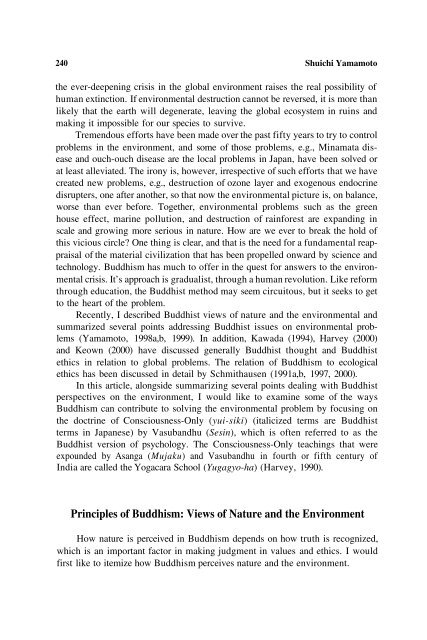Psychology & Buddhism.pdf
Psychology & Buddhism.pdf
Psychology & Buddhism.pdf
You also want an ePaper? Increase the reach of your titles
YUMPU automatically turns print PDFs into web optimized ePapers that Google loves.
240 Shuichi Yamamoto<br />
the ever-deepening crisis in the global environment raises the real possibility of<br />
human extinction. If environmental destruction cannot be reversed, it is more than<br />
likely that the earth will degenerate, leaving the global ecosystem in ruins and<br />
making it impossible for our species to survive.<br />
Tremendous efforts have been made over the past fifty years to try to control<br />
problems in the environment, and some of those problems, e.g., Minamata disease<br />
and ouch-ouch disease are the local problems in Japan, have been solved or<br />
at least alleviated. The irony is, however, irrespective of such efforts that we have<br />
created new problems, e.g., destruction of ozone layer and exogenous endocrine<br />
disrupters, one after another, so that now the environmental picture is, on balance,<br />
worse than ever before. Together, environmental problems such as the green<br />
house effect, marine pollution, and destruction of rainforest are expanding in<br />
scale and growing more serious in nature. How are we ever to break the hold of<br />
this vicious circle? One thing is clear, and that is the need for a fundamental reappraisal<br />
of the material civilization that has been propelled onward by science and<br />
technology. <strong>Buddhism</strong> has much to offer in the quest for answers to the environmental<br />
crisis. It’s approach is gradualist, through a human revolution. Like reform<br />
through education, the Buddhist method may seem circuitous, but it seeks to get<br />
to the heart of the problem.<br />
Recently, I described Buddhist views of nature and the environmental and<br />
summarized several points addressing Buddhist issues on environmental problems<br />
(Yamamoto, 1998a,b, 1999). In addition, Kawada (1994), Harvey (2000)<br />
and Keown (2000) have discussed generally Buddhist thought and Buddhist<br />
ethics in relation to global problems. The relation of <strong>Buddhism</strong> to ecological<br />
ethics has been discussed in detail by Schmithausen (1991a,b, 1997, 2000).<br />
In this article, alongside summarizing several points dealing with Buddhist<br />
perspectives on the environment, I would like to examine some of the ways<br />
<strong>Buddhism</strong> can contribute to solving the environmental problem by focusing on<br />
the doctrine of Consciousness-Only (yui-siki) (italicized terms are Buddhist<br />
terms in Japanese) by Vasubandhu (Sesin), which is often referred to as the<br />
Buddhist version of psychology. The Consciousness-Only teachings that were<br />
expounded by Asanga (Mujaku) and Vasubandhu in fourth or fifth century of<br />
India are called the Yogacara School (Yugagyo-ha) (Harvey, 1990).<br />
Principles of <strong>Buddhism</strong>: Views of Nature and the Environment<br />
How nature is perceived in <strong>Buddhism</strong> depends on how truth is recognized,<br />
which is an important factor in making judgment in values and ethics. I would<br />
first like to itemize how <strong>Buddhism</strong> perceives nature and the environment.











